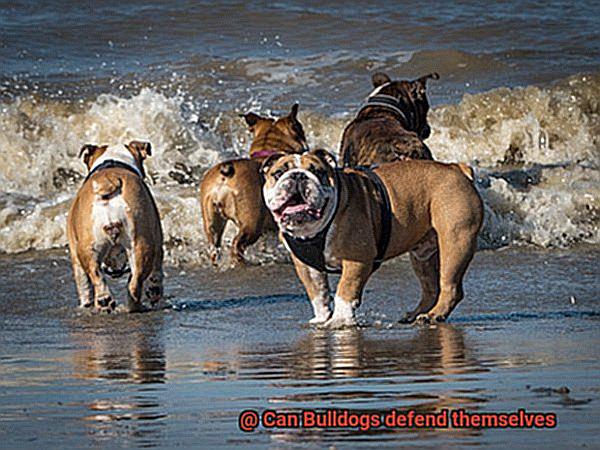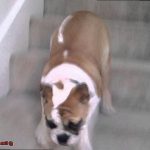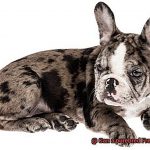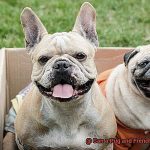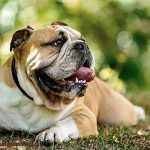Can Bulldogs defend themselves?
Imagine a Bulldog, with its stocky build and irresistibly wrinkled face. These beloved hounds are known for their friendly nature and unique appearance. But have you ever wondered if these adorable pups have what it takes to defend themselves when push comes to shove?
In this blog post, we’ll dive into the captivating world of Bulldogs and explore their natural abilities when it comes to self-defense. Whether you’re considering bringing a Bulldog into your home or just curious about these robust canines, get ready to discover that Bulldogs are more than just cuddly companions – they have an unexpected resilience that makes them formidable in their own right.
Join us as we uncover the hidden strengths, protective instincts, and untamed spirit that Bulldogs possess. We’ll provide invaluable insight into their capacity to defend themselves in all sorts of situations. So let’s dig deep and reveal the true nature of these lovable yet potentially fierce friends.
The Physical Characteristics of Bulldogs
Contents
French Bulldogs are beloved for their friendly and affectionate nature, but it’s important to recognize that they have physical attributes that contribute to their ability to defend themselves. In this article, we’ll explore the unique physical characteristics of Bulldogs and how they aid in their self-defense capabilities.
Sturdy and Muscular Build:
- Bulldogs have a sturdy and muscular build, giving them stability and balance.
- This low center of gravity allows them to hold their ground and resist being easily knocked over or pushed around.
Thick and Tough Skin:
- Bulldogs have thick and tough skin, providing some protection against bites or scratches.
- Their loose and wrinkled skin makes it difficult for opponents to get a good grip on them, reducing the chances of serious injuries.
Powerful Neck and Shoulders:
- Bulldogs possess powerful muscles in their neck and shoulders, enabling them to hold on to an opponent or defend themselves effectively.
- These attributes allow them to deliver strong bites or powerful head butts if they feel threatened or attacked.
Wide and Robust Chest:
- Bulldogs have well-developed respiratory systems due to their wide and robust chests.
- This enables them to maintain good airflow even during physical altercations, making them formidable opponents when defending themselves.
Unique Facial Structure:
- Bulldogs’ pushed-in nose, known as brachycephaly, can make it difficult for opponents to grab their snout or muzzle.
- This feature is advantageous when facing animals that rely on biting or grabbing the opponent’s face during an attack.
Bulldog’s Protective Nature
Well, let’s dive into their fascinating history and explore the reasons behind their unwavering loyalty and courage.
A Legacy of Working Dogs:
French Bulldogs may be known as cuddle bugs today, but their ancestors were fierce working dogs bred for bull-baiting. Their protective nature stems from these roots, where they were trained to defend their handlers from aggressive animals.
The Guardian Instinct:
Despite their friendly demeanor, French Bulldogs have an innate instinct to protect their families and territory. They’re naturally wary of strangers and will use their powerful bark or growls to alert their owners of potential threats.
Brawn and Bite:
Though they may not be as agile as some breeds, Frenchies compensate with their muscular build and a strong bite force. Their tenacity makes them physically capable of deterring potential attackers, showcasing their determination to keep loved ones safe.
Loyal Defenders:
French Bulldogs form deep bonds with their owners, and their protective nature is an extension of this loyalty. They’ll go above and beyond to ensure the safety of their human pack, even if it means putting themselves in harm’s way.
Proper Training Matters:
While French Bulldogs are not naturally aggressive, it’s crucial to provide them with proper socialization and training from an early age. This ensures that their protective instincts are channeled appropriately, making them well-rounded companions.
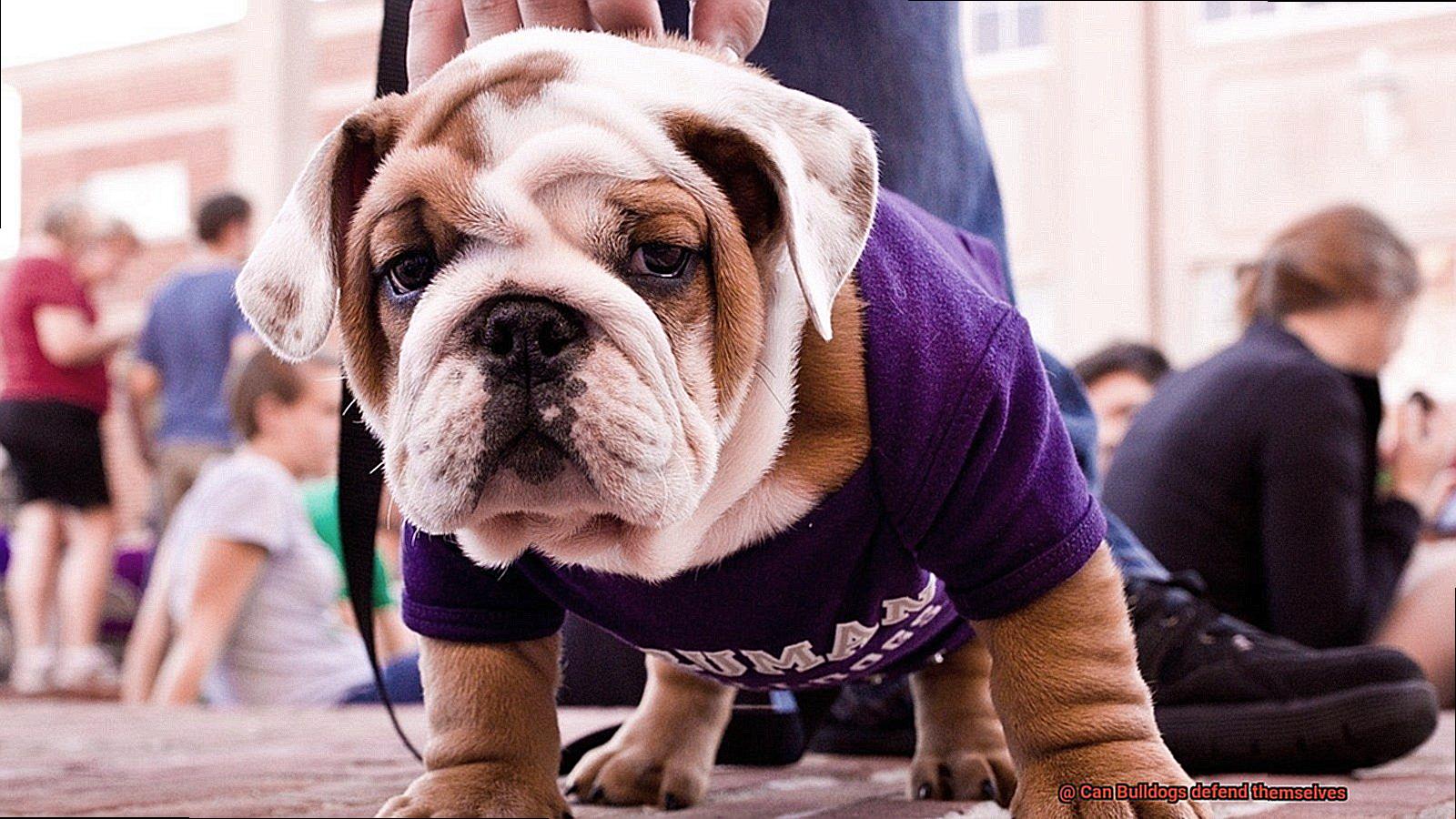
Responsible Ownership:
Remember, it’s our responsibility as owners to prioritize our Frenchie’s safety. Providing them with ongoing training, socializing them with other dogs and people, and supervising them in potentially dangerous situations are essential steps for responsible ownership.
Personal Protection Considerations:
While French Bulldogs have a protective nature, it’s important to note that there are other breeds specifically bred for personal protection. If you’re seeking a highly protective dog, it may be worth exploring other options.
Conclusion:
French Bulldogs may be small in size, but their hearts are filled with the spirit of mighty protectors. Their history as working dogs and their unwavering loyalty to their families have shaped their protective nature. Whether they’re standing their ground or using their powerful voice to warn off potential threats, these adorable warriors will always prioritize the safety of those they hold dear.
So, cherish your Frenchie’s protective instincts and provide them with the love, care, and training they deserve. After all, they are our loyal companions and guardians of our hearts.
Bulldog’s Intuitive Sense of Danger
French Bulldogs, though small in size, possess an intuitive sense of danger that makes them exceptional protectors. Their origins as working dogs bred for guarding and bull-baiting contribute to their natural instinct to assess threats and react accordingly. In this section, we will explore how Bulldogs display their intuitive sense of danger and the behaviors they exhibit when faced with potential threats.
Whether you have a French Bulldog or are considering getting one, understanding their innate protective nature can help you better care for and train your furry companion.
Detecting Threats:
Bulldogs are highly observant and attentive to their surroundings. They have a remarkable ability to read body language and interpret subtle cues, enabling them to anticipate potential danger before it escalates. Whether it’s an intruder, an aggressive animal, or a hazardous situation, Bulldogs quickly detect these threats through their keen senses.
Protective Behaviors:
When Bulldogs sense danger or feel threatened, they display various protective behaviors to defend themselves and their loved ones. These behaviors include:
- Vocalization: Bulldogs may bark loudly to alert their owners or deter potential threats. Their distinct deep bark can intimidate intruders and serve as a warning signal.
- Growling: Another form of communication, growling is a clear indication that a Bulldog perceives a threat nearby. It serves as a warning sign for potential aggressors to back off.
- Defensive Stance: Bulldogs will assume a defensive posture when they feel threatened. They may lower their bodies close to the ground, raise their hackles, and position themselves between their owner and the perceived threat.
- Alert Behavior: Bulldogs become hyper-vigilant when they sense something amiss in their environment, displaying increased attentiveness and heightened awareness of potential dangers.
Physical Strength:
While Bulldogs are not typically aggressive, their courageous and determined nature empowers them to stand their ground when provoked or threatened. Their muscular build and strong jaw provide them with physical strength that can be used for self-defense if necessary.
Training and Socialization:
To ensure Bulldogs respond appropriately in different situations, it is essential to provide proper training and socialization. By exposing them to various environments, people, and animals from an early age, you can help them differentiate between genuine threats and harmless situations.
Barking as a Deterrent to Potential Threats
When it comes to protecting their loved ones and territory, French Bulldogs are not to be taken lightly. Their distinctive barking can be an effective deterrent for potential threats, making them the perfect guardians for your home. As an expert in this field, I can assure you that a French Bulldog’s bark is more than just noise – it’s a powerful tool in warding off intruders and potential attackers.
The Power of the Bark
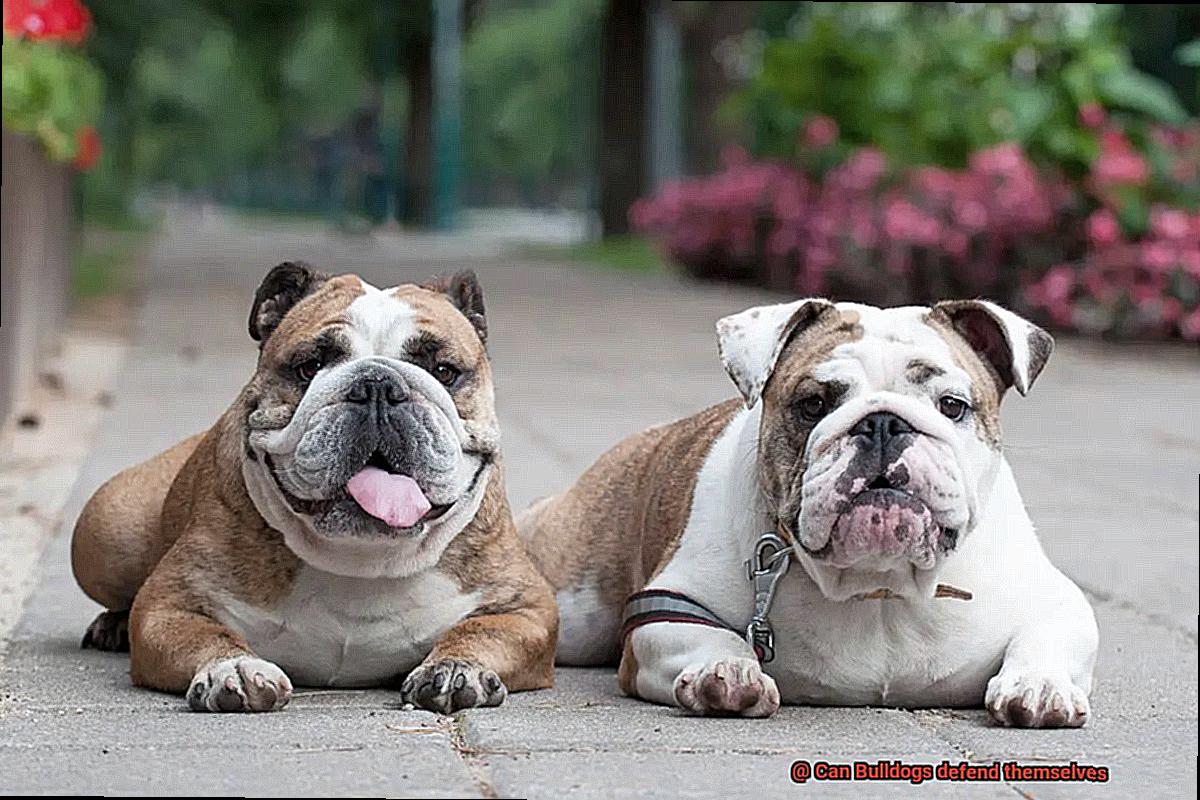
The deep, loud bark of a French Bulldog is enough to send shivers down the spine of any potential threat. Research has shown that the sound of a bulldog’s bark alone can convey power and strength, giving potential intruders second thoughts about approaching or entering your premises. The mere presence of a French Bulldog, with its intimidating bark, can make criminals think twice before attempting any wrongdoing.
Protective Instincts
French Bulldogs have an innate protective instinct towards their owners and their territory. When they sense a threat, they will not hesitate to bark loudly and continuously to alert their owners and intimidate the intruder. This protective behavior is deeply ingrained in their DNA, making them a reliable line of defense against potential threats.
Tenacity and Determination
Don’t let their small size fool you – French Bulldogs are known for their tenacity and determination. If their barking doesn’t deter the threat, they are ready to defend themselves and their loved ones. Despite their friendly and docile nature, French Bulldogs can unleash their inner warrior when it comes to protecting their family.
Training for Effectiveness
Training your French Bulldog to bark on command can be a useful tool in certain situations. Positive reinforcement training methods can be employed to teach your dog to bark when given a specific command or cue. This can come in handy when you need your bulldog’s bark to ward off a potential threat.
Socialization for Confidence
Socializing your French Bulldog from a young age is crucial to ensure they are comfortable with different people and situations. Proper socialization can reduce fear or aggression towards strangers, making them less likely to bark excessively or become aggressive without reason.
Barking as Part of a Comprehensive Security Plan
While barking can be an effective deterrent, it should not be relied upon as the sole method of defense. Implementing other security measures such as proper fencing, alarms, and training can further enhance the safety of both your French Bulldog and yourself.
Physical Defense Mechanisms in Bulldogs
When it comes to defending themselves and their loved ones, Bulldogs have an arsenal of physical defense mechanisms that make them formidable opponents. Let’s dive into these incredible attributes that make Bulldogs such a force to be reckoned with.
Strong and Muscular Build
Bulldogs are known for their compact and solid body structure. This low center of gravity provides them with stability and strength, making it difficult for an attacker to knock them off balance. Whether they are facing a potential threat or engaging in a playful scuffle, Bulldogs’ strong and muscular build gives them the advantage in physical confrontations.
Powerful Jaws and Bite Force
A Bulldog’s undershot jaw is one of its most distinctive features. This unique jaw structure, where the lower jaw extends beyond the upper jaw, gives Bulldogs a powerful grip and bite force. Once they latch onto something or someone, it’s nearly impossible to break free from their jaws. This attribute makes Bulldogs excellent guard dogs, as they can immobilize an intruder with their impressive bite strength.
Thick and Wrinkled Skin
The thick and wrinkled skin of Bulldogs serves as a natural armor against potential injuries. The wrinkles on their face, in particular, act as shock absorbers, diverting any direct impact away from vital areas such as the eyes and nose. This protective layer allows Bulldogs to withstand minor blows or strikes during a scuffle.
Sturdy and Broad Chest
Bulldogs have a sturdy and broad chest, which provides additional protection to their vital organs during potential attacks. Acting like a shield, this chest structure can absorb impacts and prevent injuries to the Bulldog’s torso. It gives them an advantage when defending themselves against larger opponents.
Tenacity and Mental Fortitude
In addition to their physical attributes, Bulldogs are known for their tenacious nature and determination. They don’t back down easily when faced with a threat or danger. This mental fortitude can be a powerful defense mechanism, as Bulldogs are less likely to retreat from a confrontation. Their courage and bravery make them even more formidable opponents.
It’s important to note that Bulldogs are generally friendly and affable dogs. They are not inherently aggressive but have the ability to defend themselves when provoked or threatened. Proper training and socialization are essential to ensure that Bulldogs use their physical defense mechanisms responsibly and in appropriate situations.
So, the next time you see a Bulldog, remember that beneath their adorable appearance lies a dog equipped with an array of physical defense mechanisms. These incredible attributes make Bulldogs not only lovable companions but also capable protectors when it matters most.
Security Through Presence and Protective Instincts
When it comes to security, bulldogs are the epitome of “don’t judge a book by its cover.” Their strong and intimidating appearance alone is often enough to send potential threats running for the hills. With their muscular build, broad chest, and powerful jaws, bulldogs possess a formidable presence that commands respect and can make anyone think twice before trying to harm them or their owners.
But it’s not just their physical appearance that makes bulldogs excellent guardians. These loyal and devoted dogs have protective instincts deeply ingrained in their nature. Their instinct to protect their families is unmatched, and they will go to great lengths to keep them safe. This protective nature is especially evident when it comes to children, as bulldogs are known for their gentle and patient demeanor around kids.
In addition to their innate loyalty, bulldogs have a strong territorial instinct. They take their role as guardians of the home seriously and will bark loudly at any sign of intruders or unfamiliar noises. This makes them excellent watchdogs, as their mere presence and alertness can deter potential burglars or trespassers.
While bulldogs may not be the most agile or quick breed, they make up for it with sheer determination and tenacity. Once they sense a threat, they become unwavering in their resolve to defend themselves and their loved ones. Their strong jaws and bite force can also serve as a formidable weapon if necessary.
It is important to note that while bulldogs have the potential to defend themselves, responsible ownership plays a crucial role in ensuring their safety. Proper training, socialization, and supervision are essential factors in enabling bulldogs to effectively protect themselves when needed. By providing a secure environment and taking necessary precautions, owners can minimize the likelihood of confrontations or threats.
XiRC37EF9kY” >
Conclusion
In conclusion, Bulldogs are more than just cute and cuddly companions. They possess the innate ability to defend themselves when the situation calls for it. With their robust physique, resilient skin, powerful neck and shoulders, broad chest, and distinctive facial structure, Bulldogs have the upper hand in physical confrontations. These physical attributes enable them to stand their ground and unleash forceful bites or headbutts if they perceive a threat.
Moreover, Bulldogs harbor a protective nature ingrained in their DNA as descendants of working dogs bred for bull-baiting. Their lineage instills in them a legacy of loyalty and bravery that compels them to safeguard their families and territory. Through instinctive behaviors like barking and growling, assuming defensive postures, and staying alert, Bulldogs effectively signal potential dangers.
While Bulldogs possess natural protective instincts, responsible ownership necessitates proper training and socialization to channel these instincts appropriately. Ongoing training is crucial to ensure that Bulldogs respond appropriately in different situations. Early exposure to other dogs and people helps them develop positive social skills while also teaching them to navigate potentially hazardous encounters under supervision.
It is important to note that Bulldogs are generally amiable dogs who do not exhibit inherent aggression. Nonetheless, they possess the capability to defend themselves when provoked or threatened. By understanding their inherent abilities and providing them with the necessary guidance and support, we can maintain Bulldogs as affectionate companions who are also capable defenders when circumstances demand it.
